In the summer issue of Emory Magazine, we asked alumni serving or working in Iraq or Afghanistan to contact us. Our intent was to present not the political but the personal side of the conflict, through Emory eyes. We heard from alumni serving as members of the armed forces, as military chaplains, in medical units, and working as private contractors; we also heard from spouses, siblings, and parents left to wait and worry from home.
These alumni are fathers, sons, husbands, and colleagues. They have volunteered to work and live in a war zone, where every crumpled newspaper beside a roadway could hide a bomb. Many live in cramped quarters that are stifling in the summer and frigid in the winter. Some visit villages where they might be greeted by smiling children, distinguished elders . . . or armed insurgents. Every day, there is danger. Every night, there is uncertainty. They have forged friendships, survived Humvee rollovers, taught high-fives to local teenagers, and found moments of inspiration and joy amid fear and anguish.
Here are their stories:
First Lieutenant Justin Wong
Inside the heavily guarded International Zone (IZ) in central Baghdad, First Lieutenant Justin T. Wong 01Ox 03C (above) works as a U.S. Air Force contracting officer in Saddam Hussein’s former Republican Palace, surrounded by marble stairways, gold fixtures, and giant frescoes of horses and missiles.
This lush, tropical area beside the Tigris River--also known as the “Green Zone,” “the Bubble,” and “the ultimate gated community,” due to the armed checkpoints, razor wire fences, and reinforced concrete walls--once was home to the presidential compound; villas for Hussein’s family, friends, and loyalists; and a private zoo containing lions and cheetahs.
The IZ now houses U.S. forces, diplomats, coalition partners, and contractors, as well as Iraqi citizens.
“Eventually, we will turn the palace over to the Iraqi government,” says Wong, whose division--the Joint Contracting Command--is charged with rebuilding Iraq’s infrastructure. “Hopefully by next summer, although I’m skeptical. . . . It’s hard to ask a nation to transform from a tyranny to a democracy overnight. Ultimately, I think there will be a democracy in the Middle East, and hopefully the democracy will spread.”
Like other Emory alumni serving in Iraq or Afghanistan, Wong sees himself as working toward a better life for the common people.
“Generations have lived in the Middle East knowing nothing of freedom, suffering from poverty and ignorance,” he wrote in an e-mail home on October 15, the day the Iraqi constitution was ratified. “If we are successful, I am sure that the world will not only be a better place, but that America will be a safer place.”
While Wong lives and works in a relatively secure area, nearby mortar attacks are common, and two of his contractors--one American, one British--were killed a few months ago.
“Even in the IZ, you wear your body armor all the time, with a loaded magazine in your weapon,” he says. “It feels like a war movie . . . helicopters flying overhead, everybody with weapons, security checkpoints.”
As an economics major at Emory, Wong planned to get a master’s degree in urban planning, then a law degree. He was in the Air Force Reserve Officer Training Corps at Georgia Tech as an undergraduate, attending ROTC courses several times a week.
“September 11 happened when I was a junior, and the war kicked off when I was a senior,” Wong says. “It wasn’t a mystery what my future held.”
He was commissioned into the Air Force after graduation and was stationed at Pope Air Force Base in Fayetteville, North Carolina. In September 2005, Wong was deployed to Iraq as a contracting officer, “using the skills I acquired at Emory to spend just a small piece of the billions of dollars the U.S. government has allocated to rebuild Iraq and provide for our forces in theater. . . . It’s where the rubber meets the road for strategic policy,” he says. “It’s long hours--about eighty a week--but very rewarding thus far.”
Wong is assigned specifically to assist the Iraqi police forces, setting up communications, arranging for training, and procuring equipment.
In October, he flew in a Black Hawk helicopter over Baghdad north to the Kurdish city of Sulymaniah to visit a police academy class of sixteen hundred trainees. Wong was struck by the “beautiful and emotional” landscape, which he described in this entry in his electronic journal:
“The flight was low and fast. Two gunners sat in both doors, ready to fire on any threat. Baghdad from above was crazy. . . . You could see the traffic, the markets, the life buzzing amidst a paradox of modernity and squalor. Along the way we passed countless shepherds with flocks of sheep and goats, farmers with ancient implements trying to scratch a living out of the dry earth. Everyone would look at the helicopter in these remote places . . . children would run, waving. Old men would stare with their hands on their hips, making me wonder if that was a posture of disapproval or just tiredness from working in the fields.”
Wong, just twenty-four, admits to being afraid sometimes, but he sees soldiers much younger than himself risking their lives daily.
“I had four years in college, but there are a lot of seventeen- and eighteen-year-olds here who joined the Army right out of high school,” he says. “I have absolute respect for their decisions, whatever they were, that led them to come here. They go out on patrol, where every pile of trash could be a bomb. They get no sleep. Coming from a place like Emory, where people are respected for their academic credentials, I have come to respect honor and courage as well. Just because someone didn’t go to an elite college doesn’t mean they’re not honorable.”
Captain William Jordan Gillis 04EvMBA
Army Captain William Jordan Gillis 04EvMBA is stationed in Ar Ramadi, about seventy miles west of Baghdad on the Euphrates River, the site of Hussein’s Northern Palace. 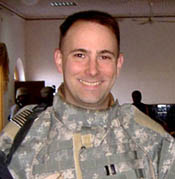 “Here in the Al Anbar province there is still very little business or economic development,” Gillis says. “The security concerns are too great.” “Here in the Al Anbar province there is still very little business or economic development,” Gillis says. “The security concerns are too great.”
After watching more than a thousand locals stand in line for six hours for a one-time payment of fifty dollars, Gillis was reminded of a discussion he had with fellow Evening MBA students at Goizueta Business School on psychologist Abraham Maslow’s hierarchy of needs--a theory that ranks human motivation from the basic (hunger, thirst, shelter) to the transcendent (self-esteem, artistic expression).
“Maslow came into play whenever I saw news articles about the constitutional debate,” he says. “That stuff makes for great political science theory discussion, but the people in Ramadi are overwhelmingly interested in simply procuring food and shelter for themselves and their families.
“It really strikes a chord with me when I see a family driving in a minivan, a son holding his father’s hand walking down the street, moms with their little girls in dresses with matching hats, purses, and shoes. It is painful to think how the war impacts these folks.”
Whether or not one agrees with the current administration’s policies, says Gillis, we “clearly cannot abandon our efforts here until all of Iraq is safe for commerce and on firmer economic footing.
“When insurgents stop shooting at us, I’ll be able to apply more advanced business school lessons to my work here.”
Petroleum engineer Per Skaug 02EMBA
Per Skaug 02EMBA, a petroleum engineer who worked in Baghdad as a private contractor, agrees that the political climate in Iraq is too volatile to make good use of advanced business principles. 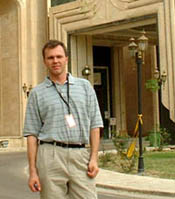 “Unemployment in Iraq is very high,” he says. “One of the things that really needs to happen is getting Iraqis back to work. That’s critical. Now, when anyone comes around and offers money for people to be involved in sabotage and suicide missions, that might look attractive. There is a lot of unrest. Most Iraqis are sick and tired of what’s going on. They’re not necessarily blaming us for it, but since we’re there and more or less in charge, the blame falls on us.” “Unemployment in Iraq is very high,” he says. “One of the things that really needs to happen is getting Iraqis back to work. That’s critical. Now, when anyone comes around and offers money for people to be involved in sabotage and suicide missions, that might look attractive. There is a lot of unrest. Most Iraqis are sick and tired of what’s going on. They’re not necessarily blaming us for it, but since we’re there and more or less in charge, the blame falls on us.”
Skaug, who is originally from Norway, worked in the Middle East for more than a decade in the petroleum sector, living in Yemen, Egypt, and the United Arab Emirates.
In 2003, after Operation Iraqi Freedom, Skaug was working for an Iraqi engineering firm in Baghdad, trying to increase oil production.
“We were basically setting up operations, waiting for the situation to be safer,” he says. “You couldn’t really set up an oil rig right then. It would be like setting up a big target.”
Initially, the mood was relatively peaceful in Baghdad.
“That fall, you could live within the community, go out to restaurants, coffee shops, and out onto the street,” he says. “Then, a couple of things happened. In the spring of 2004, four contractors were caught and killed and burned in Fallujah, and the military took strong action against the city. There was also the Abu Ghraib prison scandal. Sentiments got tougher. But it’s more than just the insurgents--there are general criminals, kidnappings. Law and order has broken down. The Iraqi police aren’t necessarily up to it, plus they are being killed left and right.”
Skaug started working for the U.S. military as a subcontractor in fuel imports. “Everyone realized the importance of keeping the fuel situation under control, so people could have fuel for cooking, heating, and driving. We were monitoring fuel imported from Turkey, Jordan, and Kuwait, to make sure it was actually getting in. Gas inside of Iraq was about four cents a gallon, cheaper than a lot of neighboring countries. People were making a lot of money through smuggling.”
After leaving Baghdad, Skaug moved to Kuwait. He is now returning to the U.S., where he plans to work as a consultant and spend more time with his wife and two children, who live in Atlanta.
“Commuting to the Middle East was very difficult on my family,” he says. “Iraqi citizens were so keen and hopeful two years ago, so relieved and happy. Now, anybody who can wants to leave. Lots of people are just worried about their families, making a living, and keeping their children alive.”
American soldiers are in a tough spot, says Skaug.
“They are on edge twenty-four hours a day. They are doing an incredible job, and it is not for lack of trying, but at the moment it is hard to see a good way out,” he says. “One of the most difficult things about being there is that you would have a meeting with someone in the morning, and then you wouldn’t ever see them again. You’re not there for very long before you lose a friend or someone you know. You work as normal, but there’s always somebody who doesn’t come back.” Captain Juan Doan 98C
Air Force Captain Juan Doan 98C, who attended ROTC at Georgia Tech while an undergraduate at Emory, served as a communications officer for an aerial surveillance aircraft unit during Operation Iraqi Freedom.
“We deployed to a classified location with the Royal British Air Force and conducted aerial intelligence, surveillance, and reconnaissance missions over southern and western Iraq,” says Doan.
The Joint Surveillance Target Attack Radar System (JSTARS) created an electronic picture of the ground battle space that could be sent immediately to American special operations forces.
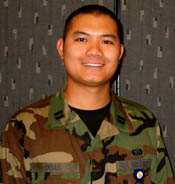 “It had immense radar capability that could provide forces in the area with critical information to locate and destroy SCUD missiles before they could be used to threaten neighboring countries, especially Israel,” Doan says. “The JSTARS aircraft had a robust array of communications systems that allowed voice and digital information to be conveyed to American forces to outflank enemy ground forces.” “It had immense radar capability that could provide forces in the area with critical information to locate and destroy SCUD missiles before they could be used to threaten neighboring countries, especially Israel,” Doan says. “The JSTARS aircraft had a robust array of communications systems that allowed voice and digital information to be conveyed to American forces to outflank enemy ground forces.”
JSTARS aircraft provided a bird’s-eye view of the ground for the battlefield commanders to shape their strategies.
“By the end of the war, we had prevented the launch of a single SCUD missile and saved countless special operations forces from being overrun by large enemy forces,” says Doan, who is now officer in charge of the 116 th Air Control Wing’s Nuclear, Biological, Chemical Contamination Defense Team
A double major in biology and history at Emory, Doan says he feels proud to be serving his country and “fulfilling a debt” from the past.
“My father served alongside American forces as part of the Vietnamese Air Force,” he says. “When Saigon fell with the rest of South Vietnam, my father, Captain Trong Doan, flew his helicopter with my mother, who was pregnant with me, landed on the U.S.S. Midway, and sailed to America where they rebuilt their lives. America may have lost the Vietnam war, but I wanted to show that this country, in turn, gained the faith, hope, and love of this one Vietnamese family. And I hope that my military service during our nation’s effort to secure freedom in Iraq will honor the legacy and patriotism of those who did the same for us more than thirty years ago.” Lieutenant Colonel J. Maddox Woodbery 80Ox 82C 85T
Chaplain (Lieutenant Colonel) J. Maddox Woodbery 80Ox 82C 85T, a U.S. Army garrison chaplain in Baumholder, Germany, has served for eighteen years in the army and was most recently deployed as the chaplain for the Second Brigade Combat Team, First Armored Division, in support of Operation Iraqi Freedom, from 2003 to 2004.
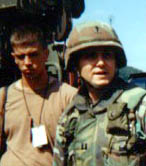 “We are in the process of preparing soldiers and their family members for another deployment as the Second Brigade returns to Iraq,” says Woodbery, an ordained elder and member of the South Georgia Conference of the United Methodist Church, who manages religious support programs for about thirteen thousand soldiers, family members, and Department of the Army civilians. “We are in the process of preparing soldiers and their family members for another deployment as the Second Brigade returns to Iraq,” says Woodbery, an ordained elder and member of the South Georgia Conference of the United Methodist Church, who manages religious support programs for about thirteen thousand soldiers, family members, and Department of the Army civilians.
Woodbery, who was preparing for a parish ministry while in seminary at the Candler School of Theology, says his joint major in history and philosophy at Emory taught him to “ask good questions, which has served me very well as an adviser to commanders, a counselor of soldiers and their families, and a leader of chaplains.”
While in Baghdad, Woodbery was headquartered in the Al Sajood Palace, the official residence of the Hussein family. He built a chapel in the remnants of the bomb-damaged palace ballroom, hiring Iraqi workers to do repairs, a carpenter to custom-make pews, and a painter to create murals on the walls. The chapel became the place of worship for Protestant, Catholic, and Jewish soldiers, and the location for Woodbery’s office.
“My time in combat was one very long prayer for the safety and protection of my men and for a change in the hearts of those who would call us 'enemy’,” he says. “The role of the army chaplain on the battlefield is to nurture the living, care for the wounded, and honor the fallen. That translates into living with soldiers every day, meeting some of those soldiers in the emergency room of the combat support hospital and being with them at their final breath, consoling their comrades who worked to keep them alive, and walking with soldiers as they consider the inevitable and often life-changing effects of combat.”
In Woodbery’s brigade, twenty-one soldiers were killed during their fifteen-month deployment--the majority by explosive devices, car bombs, or suicide bombers.
But amid the danger there were “wonderful moments, too,” Woodbery says. “For a while, we hired a pianist from the Baghdad Ballet to play for our worship services. On Christmas Day, he played the adagio from Beethoven’s Fifth Piano Concerto on a rickety old piano. It was sublime and brought me to tears.”
It’s not only American soldiers but also Iraqi families who are making “incredible sacrifices,” says Woodbery. “These parents love their children, and want for them lives better than they have had.” Major Sam Carrasco 95C
U.S. Marine Corps Major Sam Carrasco 95C began his path toward a military career when he enrolled in the Platoon Leaders Class Program his sophomore year at Emory, spending summers at the Quantico Marine Corps base and training facility in Virginia. In 1999, he was promoted to captain. 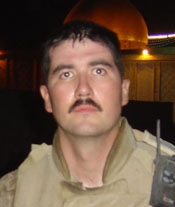 Carrasco was sent to Iraq in the summer of 2003. He and his rifle company of more than 170 were engaged in the An Najaf conflict, fighting Maqtada Al-Sadr’s militia, in August 2004, and were involved in counter-insurgency operations outside of Fallujah in the Al Anbar province from October through December of that year, in support of Operation Al Fajr. Carrasco was sent to Iraq in the summer of 2003. He and his rifle company of more than 170 were engaged in the An Najaf conflict, fighting Maqtada Al-Sadr’s militia, in August 2004, and were involved in counter-insurgency operations outside of Fallujah in the Al Anbar province from October through December of that year, in support of Operation Al Fajr.
“My worst memories include witnessing my men as they made the ultimate sacrifice,” he says. “But I’ve also seen Iraqi children’s eyes light up when we joined them for a game of soccer, women rejoice as we rebuilt homes, and Iraqi fathers share with me their wishes and dreams for their own children’s children. And I remember care packages from home and marines who gave their own care packages to Iraqis.”
Carrasco’s youngest child, Sofia, now almost a year old, was born while he was in Iraq. He was on the phone with his wife, Melody, and was able to coach her through labor and hear their baby’s first cries.
A political science major at Emory, Carrasco knew he “wanted to take the path less traveled. I wasn’t ready to commit myself to a nine-to-five job or to be pinned down to a sedentary lifestyle. I wanted the opportunity to travel, maintain a high level of physical activity, and serve the country that has blessed my family so much.”
Carrasco, a major at thirty-two, is now on his third combat tour in country and is operations officer in charge of a two-thousand-person task force--the chief operating officer, in effect, who “puts the colonel’s vision on paper and coordinates the staff.
“You experience the range of human emotions in combat,” he says. “It comes to you as a shock at first. . . the chaos, the fog of battle. Combat is never as clean as you might imagine when you’re getting shot at. But there are moments of clarity as your training and sense of purpose take hold of your emotions. You quickly learn that things are never as good--or as bad--as they seem.” Captain Michael Williams 92Ox 94C
 Army Captain Michael Williams 92Ox 94C joined the army at the beginning of his sophomore year in medical school at the University of Miami. He was deployed to Afghanistan with a medical unit in February 2005 and is now on assignment with a Provincial Reconstruction Team at a NATO Forward Operating Base station in the Farah province as the battalion surgeon and chief medical officer. He is also chief of emergency medical treatment for the 249 th General Hospital at Bagram Air Base, where his staff consists of twenty-two nurse corps officers and enlisted combat medics. Army Captain Michael Williams 92Ox 94C joined the army at the beginning of his sophomore year in medical school at the University of Miami. He was deployed to Afghanistan with a medical unit in February 2005 and is now on assignment with a Provincial Reconstruction Team at a NATO Forward Operating Base station in the Farah province as the battalion surgeon and chief medical officer. He is also chief of emergency medical treatment for the 249 th General Hospital at Bagram Air Base, where his staff consists of twenty-two nurse corps officers and enlisted combat medics.
“Our main focus is the care and treatment of the roughly eighteen thousand U.S. and coalition soldiers deployed to Afghanistan,” Williams says. “We also help care for the citizens of Afghanistan through our humanitarian assistance work.”
Williams majored in biology and anthropology at Emory and finds both valuable as a doctor immersed in a foreign culture .
“The news doesn’t even come close to covering what is going on over here. The news reports on the cost of war in lives and money,” he says. “You never get to hear about the little kids we treat or the other people we have a real positive impact on.”
Williams has been attacked with rockets, machine guns, and grenades.
“Every soldier deployed in the world is in danger,” he says. “By putting on the uniform, we make ourselves a target to those who wish to do the U.S. harm. But we cannot live in fear every day. That would drive us crazy. We just acknowledge the risks we take and do our best to be prepared for the mission at hand.”
Between periods of intense activity, there are long stretches of boredom and routine (“We call it Groundhog Day , after the Bill Murray movie,” Williams says).
But providing medical care to those in need is extremely gratifying, he says, whether they are American soldiers or Afghani citizens.
“You would be surprised by the amount of thanks and smiles we get from the people we see and treat,” he says. “Even when I tell an Afghani that there is nothing more I can do for a loved one, they thank us for trying and say that we have done more than anyone else has done for them. In this country, it is not the result that matters, but your intentions and effort.”
While Williams originally joined the army to pay for medical school, he says this past year’s experiences may have changed his goal from serving his time and moving on to staying in the army for a few more years: “I would like to use my experience to train the next generation of physician-soldiers.”
See also: “While he’s been gone”—by Texas veterinarian Kirstin Mix 93Ox 94C , whose husband, Michael Williams 92Ox 94C, is an army captain and an Emergency Medicine Physician in Afghanistan.
Corporal Jeff Jackson 04C
Corporal Jeffrey Jackson 04C , a philosophy major at Emory, enlisted in the army reserve his junior year at Emory, almost exactly one year after 9/11. He is now stationed at a small desert outpost in Afghanistan as a member of a tactical psychological operations (PSYOP) team.
“We’re the hearts-and-minds guys,” Jackson says. His PSYOP team works with the Texas National Guard infantry and Special Forces.
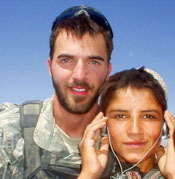 “When we get to a village, we tell the convoy where to stop and they determine how best to secure the area,” he says. “Sometimes we’ll be in one village for three or four hours, talking to village elders and mullahs, handing out 'peace papers’--newspapers produced by coalition forces that focus on the reconstruction effort--and radios, drinking tea, and taking a tour of the village. “When we get to a village, we tell the convoy where to stop and they determine how best to secure the area,” he says. “Sometimes we’ll be in one village for three or four hours, talking to village elders and mullahs, handing out 'peace papers’--newspapers produced by coalition forces that focus on the reconstruction effort--and radios, drinking tea, and taking a tour of the village.
“Our presence is enough to generate an instant crowd,” Jackson says. “The back of our Humvee is always packed with newspapers, posters, water bottles, and soccer balls.”
Although all members of the team are well armed and trained to use their weapons, “if a PSYOPer has cause to fight then something has not gone as planned,” he adds.
On a recent trip to meet with Afghani police officials and schoolteachers, the group’s Humvee--with Jackson riding in the turret--overturned on an embankment leading to a narrow bridge. Other than a gash on his shin, Jackson, and the others, were fine. It took the group six hours to extract the Humvee from the creek with the help of twenty locals who then invited the Americans to a village lunch, providing an “impromptu PSYOP,” says Jackson.
His team works in a province so impoverished that most of the children do not have shoes and all homes are small mud huts. “The literacy rate is below 5 percent,” he says. “In my conversations with locals, I find myself explaining the basics of a democratic government.”
The Taliban, Jackson says, brought stability to Afghanistan through brutality. “The experiment now is stability through democracy. There is a sense here that the experiment could still go either way, but that this is cause for dedication, not pessimism.” BONUS CONTENT: The following articles are web exclusives, which do not appear in the print edition of Emory Magazine.
“Policing the Police”—Essay by Nate Chittick 01C, on working with local Iraqi police.
E-mails Home to Dad—Specialist Jeff Jackson 04C has been e-mailing his dad, Nathan, since his deployment in psychological operations. |